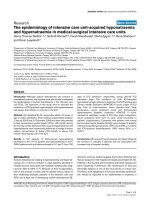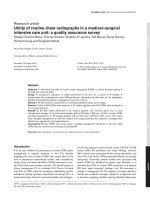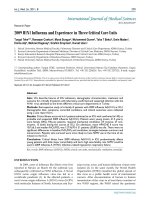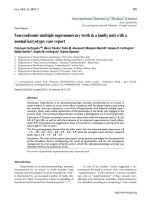unit synonyms
Bạn đang xem bản rút gọn của tài liệu. Xem và tải ngay bản đầy đủ của tài liệu tại đây (327.71 KB, 10 trang )
The definition of synonyms
Traditionally synonyms are described as words
different in sound-form but identical or similar in
meaning.
But!
It is not accurate to speak of synonyms as identical in
meaning as the same range of idea may be very wide.
Very common definitions of synonyms as words of the
same language having the same meaning or as different
words that stand for the same notion are not accurate
either.
• These traditional definitions have been criticized
because they are in a way misleading.
We cannot apply these definitions to
polysemantic words — they cannot be
synonymous in all their meanings. A
polysemantic word may enter as many
groups as it has lexico-semantic variants.
to close — to finish, to close — to shut; to
feel — to touch — to handle — to probe,
to feel — to sound — to try — to prove.
Some words are collocationally
restricted.
Win
Gain
victory
But!
Win
+ WAR
It is impossible to speak of identity of lexical meaning as
a whole, as it is only one component of lexical meaning
that may be described as identical or similar.
to die — to pass away
- differ in their stylistic reference;
- it is the similarity of the denotational meaning that
makes them synonymous.
Both adverbs fairly and rather can be used to
mean "moderately", and they often enable us to
express an opinion.
- fairly - to suggest our approval.
- rather- to suggest both our approval and our
disapproval, and our intended meaning is made
clear either by the context or by the word that
rather qualifies. Thus, differentiation of
synonyms may be observed in different semantic
components.
Recently attempts have been made to introduce
into the definition of synonyms the criterion of
interchangeability (взаимозаменяемость ) in
linguistic contexts.
This criterion implies that the words are
synonymous if either of them can occur in the same
context and we can assume that synonyms are
words interchangeable in some contexts.
eye-doctor/oculist, radio/ wireless, telegram/wire.
The English scholar R. Quirk
explains this fact as follows:
the comparison of the sentences "the rainfall in
April was abnormal" and "the rainfall in April
was exceptional" may give us grounds for
assuming that exceptional and abnormal are
synonymous. The same adjectives in a different
context are by no means synonymous, as we may
see by comparing "my son is exceptional" and
"my son is abnormal".
Words synonymous in some lexical contexts may
display no synonymity in others, they are
interchangeable only in certain environments.
Deep
Profound
But!
Deep + water
sympathy
The semantic difference between synonyms is supported by
the difference in valency and distribution.
Valency is a permanent discrimination characteristic that
always accompanies the differentiation in the semantic
characteristics.
Lexical synonyms are different words of the same part of
speech having the same grammatical distribution, which have
some common denotational components of meaning, but
differ either in some denotational component(s) or in some
connotational components of meaning and thus usually have
different lexical valency.









